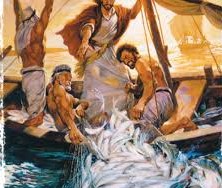
My Friend Peter
If you’re a Christian, or seeking God in the Christian tradition, do you ever feel like you don’t quite measure up?
I do, and I mentioned this in a roundtable (literally) discussion with fellow parishioners in our parish of Pax Christi last year and an elderly woman (about my age, that is), responded, “Did Jesus ever ask you to measure up?”
I didn’t know how to answer that question at the time, but after thinking about it, I think I would answer, “Well, no, not me personally, but there are plenty of instances in the gospels where Jesus appears to require perfection or near-perfection.
“You, therefore, must be perfect, as your heavenly Father is perfect,” comes to mind. Some commentators say that means that you should strive to be as close to God’s perfection as possible. Maybe, but that’s not how the translation goes.
Do We Reflect Our Beliefs in Our Lives?
I think this way not only about me, but about Christians and other religious people. I write often in this blog about why people – especially young people – have stopped going to church or have given up on God. What I haven’t mentioned is the part of believers in this phenomenon. Do we reflect our beliefs in the way we live?
We may go to Mass but don’t forgive. We may go to church services but hold grudges. We may serve on church boards but don’t welcome strangers and foreigners. We may receive communion but don’t recognize Christ in others. We may profess a religion but place our politics above what our religion teaches.
“This people honors me with their lips,” says Jesus in Matthew’s gospel, quoting the prophet Isaiah, “but their heart is far from me.”
“Be Perfect?”
Believe it or not, one of the moderating factors for me for the “be perfect” kinds of gospel passages is the apostle Peter. I love Peter. For me, he represents all of us who strive but inevitably fail in “quite measuring up.”
He’s also the most interesting of the apostles, in my opinion, an impulsive guy who often puts his foot in his mouth, often thinks of himself first and was often the target of Jesus’ rebukes.
But he’s all heart. His character is one reason to believe in the gospels’ genuineness: if the first century authors of the Christian Bible were merely writing public relations tracts, as some critics say, they certainly didn’t do a good job of painting their leader, Peter, in a good light.
Peter jumps in the lake in a faithless attempt to walk on water to get to Jesus. He’s like the “fool who rushes in” when witnessing Jesus’ transfiguration, impulsively suggesting the construction of 3 tents for Jesus, Moses and Elijah. He contradicts Jesus when Jesus tries to tell the disciples about the upcoming trip to Jerusalem and its fatal outcome. There, after swearing allegiance, Peter cowers before people accusing him of being a Jesus crony and denies even knowing Jesus.
The Rock
Peter clearly didn’t measure up, but Jesus loved him and named him leader of the twelve apostles, the “rock” on which to build church. For us Catholics, he became the first “pope.”
I know the woman at our round-table discussion was right. We need not worry about “measuring up.” I know by faith that God loves us unconditionally. But I believe many of us are accustomed to use the world’s criteria in judging ourselves and others.
The Bible contains a lot of passages that are poorly explained, but ultimately, I believe people searching for God in the Christian tradition should pay a lot of attention to Jesus’ words in Matthew’s gospel: “Judge not, that you may not be judged.”
And that applies to oneself as well as to others.





